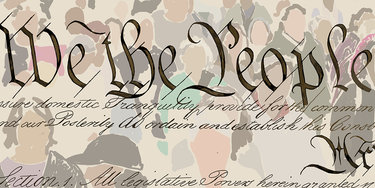Eternal vigilance is the price of liberty
It is easy to take things for granted, to take as inevitable something we were born into, something that has existed for as long as any of us in this country have been alive.
It is hard to imagine a time when monarchs ruled in kingdoms around the world, when republicanism — in which power rests with the people — was a radical idea.
The Constitution of the United States was a bold and brilliant departure from the norm. From its very first words — “We the People” — that departure is made clear.
Sybillyn Jennings can recite the Constitution’s preamble without hesitation:
We the People of the United States, in Order to form a more perfect Union, establish Justice, insure domestic Tranquility, provide for the common defense, promote the general Welfare, and secure the Blessings of Liberty to ourselves and our Posterity, do ordain and establish this Constitution for the United States of America.
Jennings came up with the idea of celebrating Constitution Day in Altamont this Sept. 17, the day in 1787 that the document was signed by the 39 delegates who drafted it at the Constitutional Convention in Philadelphia.
As she wrote in a letter to the editor last week, a decade after the brutality and sacrifices of World War II, President Dwight D. Eisenhower asked the people of the United States to reflect on the vision of the framers by observing Constitution Week with “ceremonies and activities in their schools and churches, and in other suitable places.”
Jennings, who lives in Knox, worked with other members of Helderberg Indivisible to make the Constitution Day event “a celebration rather than a condemnation or finding the limitations of which there are certainly many as we are discovering,” she said.
People from Knox and Berne as well as Guilderland and Altamont — people Jennings hadn’t known before — worked together and learned more about the Constitution themselves as they studied it to put the celebration together.
After the preamble, the document has seven articles — three of them setting up the legislative, judicial, and executive branches of government — and importantly one that allows for amendments, the first 10 being the Bill of Rights followed by 17 more.
“To my mind, the genius of the Constitution is Article 5, the amendment process,” said Jennings. She said of the framers, “They knew that change was inevitable.”
Much of the celebration, which Jennings hopes will become annual, was geared toward children. Flyers were distributed to local elementary schools.
While popcorn and ice cream are attractions, the true sustenance came from the activities. “We’ve tried to look at particular pieces rather than try to take on the Constitution as a whole,” Jennings said.
Katie Fahrenkopf had kids making buttons as they learned about the 19th Amendment, which gave women the right to vote; she spoke of the second wave of the women’s movement, too.
Erin Keaton, a Mohawk teacher, had celebrants do beadwork as they learned about the democracy of the Haudenosaunee that influenced the writing of the Constitution. A former Altamont Elementary principal taught about “the checks and balances that are intended in the first three articles of the Constitution and how those may crash into each other.”
In a story-time segment, Edna Litten read Dr. Seuss’s “Yertle the Turtle.” Yertle, the king of the pond, wants to expand his kingdom and has the other turtles stand on top of each other, declaring, from his towering perch, he is king of all he sees — until the turtle at the bottom of the stack burps and the throne comes tumbling down.
Jayne Hanson told the story of Kate Mullany, an Irish immigrant who started the all-women Collar Laundry Union in Troy in 1864.
Jennings herself taught about civil rights and how that affected schools. “We’re not trying to be didactic,” she said. “We are trying to engage especially young kids.” She asked them, “What do you care about in your school? … What do you want your school to be?”
Jennings, who has retired from teaching psychology at Russell Sage College, said, “I’ve studied children for a long time. Children are very wise and very smart if we give them a chance.”
She was particularly impressed with comments made by one boy, 11 or 12 years old, a baseball player. At the time of the Declaration of Independence, he said, “People gave and said they would give their lives, their fortunes, and their sacred honor. And now, it’s all over again; we have to do it again.”
Reflecting on the boy’s words, Jennings said, “I thought what an insightful, wonderful comment.”
We agree.
Each one of us should read the Constitution and be vigilant to see it is followed. Democrats and Republicans, conservatives and progressives alike need to understand the importance of the Constitution — its importance transcends party lines and cultural differences.
It is the foundation of who we are as a nation.
Our Constitution is the world’s longest-serving written charter of government — the document that many nations used as a model for their own. We must not take it for granted.
We are at a critical time when the V-Dem Institute’s 2025 report showed that, as of 2024, worldwide, there were more autocracies (91) than democracies (88) for the first time in over 20 years.
The Economist Democracy Index for 2024 lists the United States among the “flawed democracies” unlike the “full democracies” in, for example, Australia, Canada, Germany, Iceland, Japan, New Zealand, Norway, Sweden, or the United Kingdom.
We liked the Altamont celebration of Constitution Day because it provided a chance for people of any political party or political belief to participate. There were no speeches by politicians. The only words that were read were those in the Constitution’s preamble.
The rest was to engage and enlighten.
“People are frightened and terrified,” said Jennings. “I think we just simply cannot avoid the fears of violence, the awful shootings, and schools have taken it on the chin over and over again.”
The point of the celebration this year and in years ahead, she said, is “to find a way to just a little window to open up to the better angels, as Lincoln says, in ourselves.
Jennings went on to quote from Abraham Lincoln’s Gettysburg Address as she concluded, “We need to strengthen our sense that, of all the powers that are laid out in the Constitution, ultimately the powers are with the people … that government of the people, by the people, for the people, shall not perish from the earth.”
We all have that responsibility.



